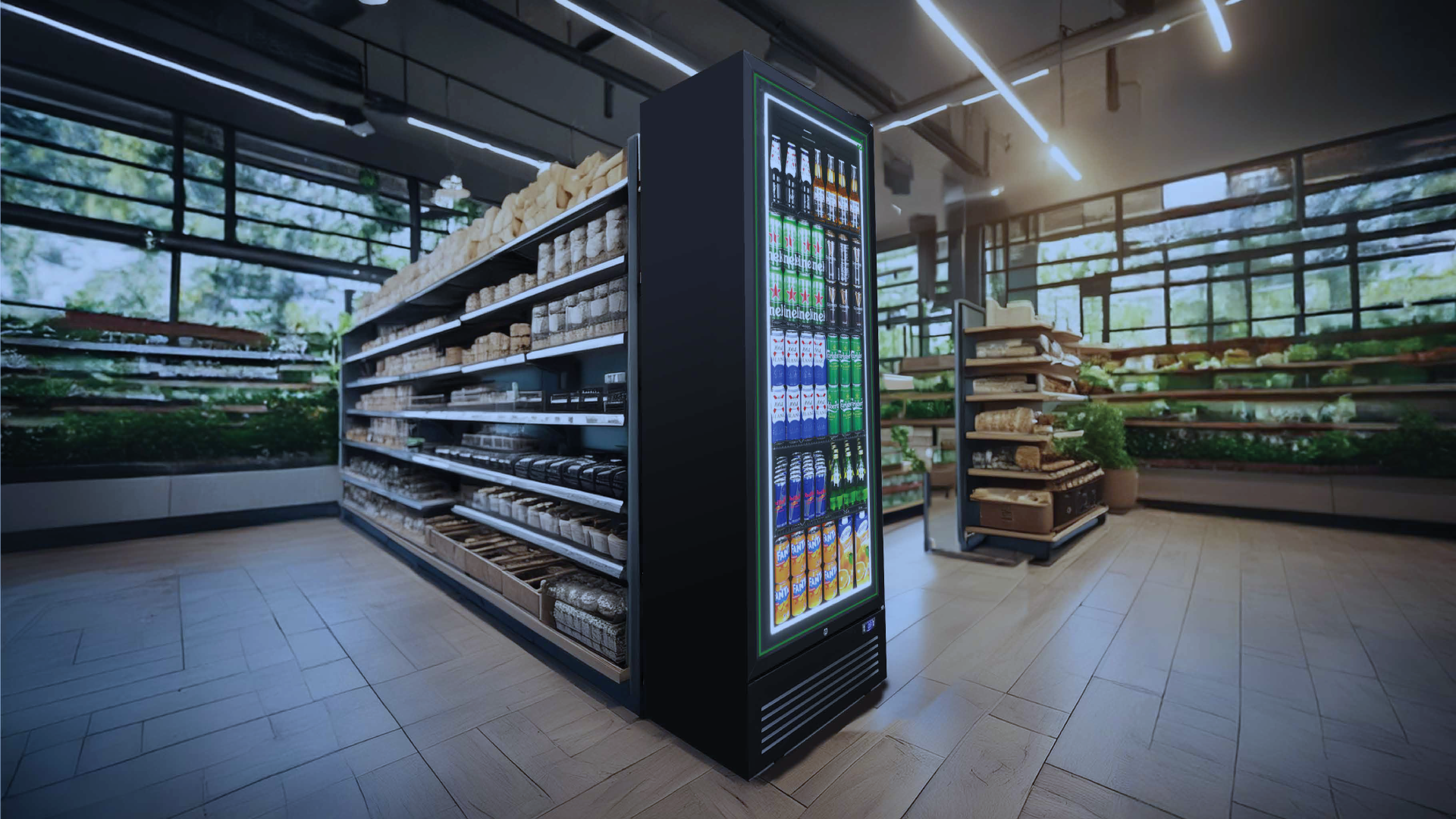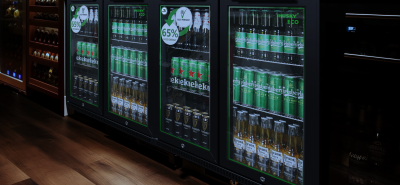The Ultimate Guide to Commercial Fridges: Everything You Need to Know
For any business in the food service or retail industry, reliable commercial fridges are a must-have. This guide will provide you with all the essential information you need to choose the perfect commercial fridge for your business, helping you keep your operations running smoothly and efficiently.
What are commercial fridges?
Commercial fridges, also called commercial refrigerators, are a must-have for almost any business. It’s designed to keep perishable goods fresh and at the right temperature. Unlike the fridge you have at home, a commercial fridge is built tough to handle the busy environment of a business, with more space and stronger cooling.
Key Features of Commercial Fridges
Durability and Build Quality
Commercial display fridges are made to last, using sturdy materials that can handle the daily wear and tear of a busy shop or café. They’re built to withstand frequent use, ensuring long-term reliability.
Capacity and Storage
These fridges come in various sizes, from compact under-counter units to larger models. They’re designed to maximise space, often featuring adjustable shelves and spacious storage areas for all kinds of products like drinks, dairy, sandwiches and more.
Temperature Control and Consistency
Maintaining a consistent temperature is crucial to keeping products fresh. Commercial display fridges have robust compressors and reliable temperature controls to ensure everything stays at the perfect temperature, even during busy periods.
Energy Efficiency
Modern commercial display fridges are designed with energy efficiency in mind. With features like improved insulation, LED lighting, and efficient compressors, they help keep energy costs down while still performing at their best.
Compliance with Health and Safety Standards
These fridges meet strict health and safety standards, featuring easy-to-clean surfaces and designs that make daily maintenance straightforward. They help ensure your business complies with all necessary food safety regulations, giving you peace of mind.
What is the difference between commercial and domestic refrigerators?
When picking a fridge, it’s handy to know the differences between commercial and domestic models. While both keep your food and drinks chilled, their design, features and intended uses vary quite a bit. Let’s break it down:
Purpose and Usage
- Commercial Fridges: These are designed for businesses like shops, pubs, restaurants and cafes. They can handle being opened and closed a lot, store large amounts of food and drinks, and meet strict hygiene standards.
- Domestic Fridges: These are made for household use. They’re perfect for family needs, offering enough space for groceries and leftovers. They’re not used as intensively as commercial units.
Construction and Durability
- Commercial Fridges: Built with heavy-duty materials and going through toughness tests these fridges can withstand the hustle and bustle of a busy business. They’re sturdy and durable, with strong components to handle frequent use.
- Domestic Fridges: Made with lighter materials like plastic and thinner metals, home fridges are designed to look good in your kitchen. They don’t need to be as tough as commercial ones.
Size and Capacity
- Commercial Fridges: Available in various sizes, from under-counter units to large remote units, they offer lots of storage space for bulk purchases and big inventories. They often have adjustable shelves and compartments to keep things organised.
- Domestic Fridges: These are smaller, and designed to fit in a home kitchen. They provide enough space for family needs but don’t have the extensive capacity of commercial fridges.
Cooling Performance
- Commercial Fridges: With powerful compressors and advanced cooling systems, these fridges keep temperatures consistent even when opened frequently. They quickly return to the right temperature after the door is closed, crucial for food safety.
- Domestic Fridges: While reliable, home fridges don’t have as robust cooling systems. They keep temperatures steady but don’t recover as quickly after being opened a lot.
Energy Consumption
- Commercial Fridges: These larger units with powerful cooling systems use more energy. However, many modern commercial fridges, like the Husky Eco Back Bar, come with energy-efficient features to help reduce costs.
- Domestic Fridges: Smaller and used less intensively, home fridges are generally more energy-efficient. They’re often rated for energy efficiency to help guide consumers minimise household electricity use.
Noise Levels
- Commercial Fridges: These can be noisier due to their powerful compressors and fans, which are necessary for keeping things cool in a busy environment. Noise isn’t a big concern in commercial settings.
- Domestic Fridges: Designed with home comfort in mind, these fridges are usually quieter. Manufacturers focus on reducing noise to avoid disrupting your home.
Compliance and Standards
- Commercial Fridges: Must meet strict health and safety regulations, including features like easy-to-clean surfaces and reliable temperature controls to ensure food safety and hygiene.
- Domestic Fridges: While safe and reliable, home fridges don’t need to meet the same rigorous standards as commercial ones. Their design is more about convenience and user-friendly features.
Types of commercial fridges
Commercial fridges come in all shapes and sizes to fit different business needs. Let’s break down the main types based on how they’re set up and where they’re used.
Plug-in Refrigerators
Plug-in fridges have all their cooling parts, like the condenser and evaporator, built into one unit.
- Advantages: These fridges are a breeze to set up – no need for special installations. You can move them around easily, which is great if you’re thinking of rearranging or relocating. Plus, they’re generally more affordable upfront since they don’t require extra piping or complex setups. Their all-in-one design means they’re easier to manage, especially for small businesses with limited technical help.
- Disadvantages: On the downside, plug-in fridges can be noisy and produce heat, which isn’t ideal for smaller spaces. This can mean higher air conditioning costs and a less comfy environment. They also typically have less storage space than other types, which might not work for larger businesses. And because the heat stays in the same space, they can be less energy-efficient.
Retail Fridges
Retail fridges are perfect for shops and supermarkets. They keep products at the right temperature while making them look appealing to customers.
Supermarket Cabinets with Glass Doors: These are common in supermarkets. They have clear glass doors, so customers can see what’s inside without opening them, which helps maintain the temperature and saves energy.
Types of Supermarket Cabinets:
- Glass Door Refrigerators: Versatile and robust, these are great for storing various food items, ensuring they stay safe and fresh. They’re perfect for busy supermarkets.
- Beverage Coolers: These are designed to keep drinks cool. They’re not certified for food, but they do an excellent job of displaying and chilling drinks.
Pubs and Restaurant Fridges
These fridges are tailored for the hospitality industry, making it easy to access and promote beverages.
Back Bars: These fit neatly under counters, providing quick access to drinks. They usually have glass doors, making it easy to see what’s inside and speed up service.
Wine Coolers: Essential for any place that serves wine, these fridges keep wine at the perfect temperature and humidity, ensuring every bottle tastes just right.
Healthcare Fridges
These fridges are crucial for storing sensitive materials that need exact temperature control.
Medical Refrigerators: Designed for storing pharmaceuticals, vaccines, and other medical supplies, these fridges often have features like temperature alarms and locks to ensure everything stays safe and at the right temperature.
Laboratory Refrigerators: Used in research facilities, these fridges offer superior temperature stability and often come with advanced features like digital displays and security locks.
Florist and Garden Centre Fridges
Floral Coolers: These fridges keep flowers and plants fresh by maintaining the perfect temperature and humidity. They’re a must-have for florists and garden centres to ensure their products look their best for as long as possible.
Remote Configuration Refrigerators
Remote configuration fridges have their cooling units (condensers) set up separately from the fridge itself. This setup is often used in large retail environments to cut down on heat and noise in the display area.
Advantages: These systems keep the store cooler and quieter by locating the condenser units outside, creating a more comfortable environment for customers and staff. They can handle larger refrigeration needs and offer more flexibility in terms of capacity, making them ideal for big businesses. They’re also more energy-efficient since the heat generated is expelled outside, reducing the load on both the refrigeration units and the air conditioning system. Plus, remote systems often last longer due to their robust construction and reduced wear and tear.
Disadvantages: On the downside, remote refrigeration systems are more complex to install and require specialized skills, which can increase the initial setup time and cost. The initial investment is typically higher due to the complexity and the need for extra components like piping and external condensers. Maintenance and repairs can be more complicated and costly, often requiring professional service technicians with specialized knowledge. If the remote condenser is in a hard-to-reach area, it can complicate routine maintenance and emergency repairs. Once installed, remote systems aren’t easily moved, which can be a disadvantage for businesses that might relocate or significantly change their layout.
Retail Fridges
Supermarket Cabinets with Glass Doors: Similar to their integrated counterparts, these remote configuration units are found in supermarkets. The main advantage is that the heat generated by the refrigeration process is expelled outside the store, reducing the load on the store’s air conditioning system and maintaining a more comfortable shopping environment.
Professional Refrigerated Storage Cabinets
Although they are not classified as commercial refrigerators, professional refrigerated storage cabinets are a must-have for businesses that need to store large amounts of perishable items at specific temperatures. These cabinets are not designed to have a direct sales function, but to offer maximum storage space while keeping strict temperature controls.
Food Service Fridges
Reach-in Cabinets: These units are perfect for kitchen staff to easily access stored items. They’re ideal for kitchens that need to store a variety of food items in a compact space.
Under-Counter Refrigerators: These smaller fridges fit neatly under kitchen counters, providing convenient access to ingredients. They’re great for reducing the distance staff need to move while preparing food.
Blast Chillers: These specialized units rapidly cool down hot food items, ensuring food safety by quickly passing through the temperature danger zone where bacteria can multiply. They are essential in food service operations to comply with health regulations and maintain the quality of prepared foods.
Factors to Consider When Choosing a Commercial Fridge
Picking the right commercial fridge is key to keeping your business running smoothly. Here are some important things to keep in mind when choosing one:
Temperature Requirements
Different fridges are designed to work at specific temperatures. For example, a beverage cooler, like a display fridge, might chill drinks to about 4 degrees Celsius but can have slightly warmer areas. This is fine for drinks but not great for perishable food that needs consistently lower temperatures to stay fresh.
Duty Rating: Light Duty vs Heavy Duty
The duty rating tells you how much use a fridge can handle. Light-duty fridges are best for places with moderate use and stable room temperatures, like small cafes or for storage. Heavy-duty fridges are built for busy commercial kitchens with lots of door openings and higher temperatures. Picking the right duty rating ensures your fridge can keep up with your business’s demands.
Size, Capacity, and Door Configuration
Your fridge’s size and capacity should match your business needs. If you operate in the retail industry and have seasonal fluctuations, multiple single-door units might be better. They let you set different temperatures in each compartment and minimise temperature loss when you open just one door. This helps manage inventory and avoids overstocking or shortages. However, double or triple-door fridges often use less energy overall and offer more storage, making them cost-effective for high-volume needs.
Energy Efficiency
Energy use is a big factor in choosing a fridge. Models with high energy efficiency can lower your operating costs and reduce environmental impact. Look for features like better insulation, LED lighting, and efficient compressors. While these fridges might cost more upfront, they save money over time.
Accessibility and Ease of Use
Think about how easy the fridge is to use in your space. Fridges with glass doors let bar staff see inside without opening the door, reducing temperature fluctuations. Adjustable shelves help organise different-sized products and make them easier to access.
Maintenance and Durability
Maintenance and durability are crucial. Features like self-closing doors, removable gaskets, automatic defrost systems, and low-maintenance condensers can cut down on maintenance and extend the fridge’s life.
Brand Reputation and Warranty
Finally, consider the brand’s reputation and the warranty offered. Well-known brands like Husky, with good reviews, are usually more reliable and provide better customer support. A solid warranty offers peace of mind, covering repairs and replacements if something goes wrong.
Choosing the right commercial fridge is essential for any business. A good fridge enhances efficiency, maintains product quality, and ensures customer satisfaction. By considering key factors like durability, capacity, temperature control, and energy efficiency, you can select a fridge that meets your needs and stands up to the demands of a busy environment. Make an informed decision to keep your business running smoothly and successfully.









